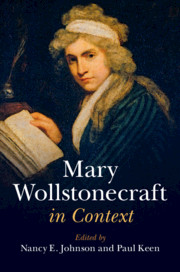Book contents
- Mary Wollstonecraft in Context
- Mary Wollstonecraft in Context
- Copyright page
- Contents
- Illustrations
- Notes on Contributors
- Preface
- Frontispiece
- Chronology
- Part I Life and Works
- Part II Critical Fortunes
- Part III Historical and Cultural Contexts
- The French Revolution Debate
- The Rights of Woman Debate
- Philosophical Frameworks
- Chapter 16 French Philosophes
- Chapter 17 Dissenters
- Chapter 18 Jean-Jacques Rousseau
- Chapter 19 Edmund Burke
- Chapter 20 William Godwin
- Chapter 21 Political Theory
- Chapter 22 Feminist Theory
- Legal and Social Culture
- Literature
- Suggested Further Reading
- Index
Chapter 20 - William Godwin
from Philosophical Frameworks
Published online by Cambridge University Press: 16 January 2020
- Mary Wollstonecraft in Context
- Mary Wollstonecraft in Context
- Copyright page
- Contents
- Illustrations
- Notes on Contributors
- Preface
- Frontispiece
- Chronology
- Part I Life and Works
- Part II Critical Fortunes
- Part III Historical and Cultural Contexts
- The French Revolution Debate
- The Rights of Woman Debate
- Philosophical Frameworks
- Chapter 16 French Philosophes
- Chapter 17 Dissenters
- Chapter 18 Jean-Jacques Rousseau
- Chapter 19 Edmund Burke
- Chapter 20 William Godwin
- Chapter 21 Political Theory
- Chapter 22 Feminist Theory
- Legal and Social Culture
- Literature
- Suggested Further Reading
- Index
Summary
The philosophical anarchist William Godwin (1756–1836) has long been celebrated and excoriated for what Charles Lamb later dubbed “the famous fire cause.”1 Lamb refers to one of the most audacious propositions in An Enquiry Concerning Political Justice (1793), Godwin’s major philosophical work. Suppose you were given the choice of saving Archbishop Fénelon or his chambermaid from a burning palace. (Fénelon was the author of Les aventures de Télémaque (1699), a thinly veiled attack on the French monarchy.) According to Godwin, the truly benevolent individual would save Fénelon because of his superior value to humanity—even if the chambermaid were one’s wife or mother: “What magic is there in the pronoun ‘my,’ to overturn the decisions of everlasting truth?”2
- Type
- Chapter
- Information
- Mary Wollstonecraft in Context , pp. 173 - 181Publisher: Cambridge University PressPrint publication year: 2020
- 3
- Cited by

